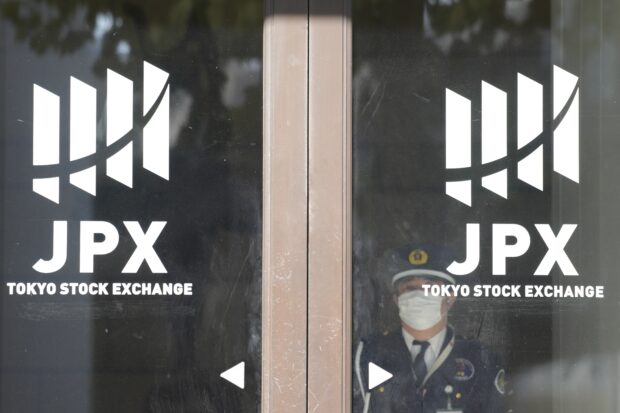
A security guard stand guards at a door of Tokyo Stock Exchange Thursday, Nov. 9, 2023, in Tokyo. Shares were mostly lower in Asia on Thursday, Nov. 23, after a modest advance on Wall Street that kept the market on track for a fourth straight weekly gain.(AP Photo/Eugene Hoshiko)
BANGKOK — Shares were mixed in Asia on Thursday after a modest advance on Wall Street that kept the market on track for a fourth straight weekly gain.
Markets in Japan and the U.S. are closed for holidays.
Oil prices fell about $1 a barrel after OPEC postponed until next week a meeting to discuss production cuts. The oil cartel has been maintaining a tight market for crude oil with production cuts. It is expected to extend those cuts after oil prices have fallen after a spike in the summer to almost $100 a barrel.
Hong Kong’s Hang Seng reversed early losses, gaining 0.5 percent to 17,818.25 and the Shanghai Composite index rose 0.6 percent to 3,061.86.
Markets in Greater China have been swaying in reaction to moves by Chinese regulators to prop up the ailing property market. Shares in troubled developer Country Garden jumped 16 percent amid reports that it is included on a list of real estate companies eligible for financing support. Sino-Ocean Group Holding’s shares soared 27 percent.
Australia’s S&P/ASX 200 shed 0.6 percent to 7,029.20. In South Korea, the Kospi edged 0.1 percent higher, to 2,514.96.
Bangkok’s SET lost 1 percent and the Taiex in Taiwan was down 0.1 percent. The Sensex in Mumbai opened up 0.1 percent.
On Wednesday, the S&P 500 rose 0.4 percent to 4,556.62. The Dow rose 0.5 percent to 35,273.03 and the Nasdaq gained 0.5 percent to 14,265.86.
Trading was muted ahead of the Thanksgiving holiday on Thursday. U.S. markets will be open for half a day on Friday.
Technology and communications services stocks accounted for a big share of the gains for the S&P 500. Microsoft rose 1.3 percent and Google parent Alphabet added 1.1 percent.
Broadcom slipped 0.9 percent after announcing that it expects to complete its $69 billion deal to acquire VMWare on Wednesday after clearing all regulatory hurdles.
A 0.9 percent drop in oil prices weighed on energy companies. Energy giant Exxon Mobil fell 0.4 percent and oilfield services company Halliburton dropped 0.8 percent.
READ: Oil down more than 1% as uncertainty swirls over delayed OPEC+ meeting
Nvidia fell 2.5 percent, despite handily beating analysts’ profit and revenue forecasts. Export restrictions to China are pressuring the company, though its stock has more than tripled this year amid booming demand for its chips in artificial intelligence applications.
Earnings reports continue to drift in. Department store operator Nordstrom fell 4.6 percent after trimming its profit forecast for the year. Clothing retailer Guess slumped 12.3 percent after cutting its financial forecast.
Treasury yields were relatively steady. The yield on the 10-year Treasury rose to 4.41 percent from 4.4 percent late Tuesday. The yield on the 2-year Treasury slipped to 4.88 percent from 4.89 percent late Tuesday.
A consumer sentiment survey by the University of Michigan showed that confidence remains strong. Wall Street has been closely watching consumer spending and confidence reports for more clues on the economy’s path ahead.
READ: Oct retail sales slip as consumers pull back after summer splurges
Forecasts for a potential recession have been pushed further out into 2024 while also being softened. The rate of inflation continues to ease, consumer spending remains solid and the economy is generally humming along. That has encouraged hopes, and bets, that the Federal Reserve is done raising interest rates and could soon consider cutting rates.
“Turkey prices cost around 5.6 percent less than last year, stuffing mix costs nearly 3 percent less, pie crusts are nearly 5 percent cheaper and cranberry prices are down by more than 18 percent,” Ipek Ozkardeskaya of Swissquote said in a commentary. “It is said that an average 10 people Thanksgiving feast would cost less than $62 — that’s less than $6.2 per person, down from around 4.5 percent compared to last year.”
Fed officials have said the outlook for the economy remains uncertain and they’ll make upcoming decisions on rates based on incoming reports. The Fed will get another big update next week when the government releases its October report for a key inflation measure tracked by the central bank.
In other trading Thursday, U.S. benchmark crude oil lost 67 cents to $76.43 per barrel in electronic trading on the New York Mercantile Exchange. It dropped 67 cents to $77.10 per barrel on Wednesday, but fell as low as $73.50 during trading.
Brent crude, the international pricing standard, gave up 84 cents to $81.12 per barrel.
The U.S. dollar slipped to 149.01 Japanese yen from 149.56 yen. The euro rose to $1.0913 from $1.0889.

